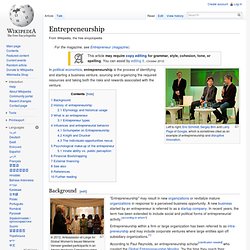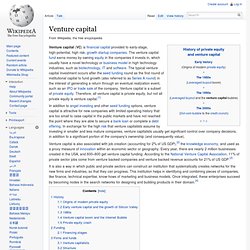

The Bootstrapper's Bible. <A HREF=" Widgets</A> Issue 8 | The Bootstrapper's Bible By Seth GodinPublished Nov. 16, 2004 3:00 p.m.

Available to you once again! There's never been a better time to start a business with no money. This manifesto will show you how. Bootstrap funding. In political economics, entrepreneurship is the process of identifying and starting a business venture, sourcing and organizing the required resources and taking both the risks and rewards associated with the venture.

Background[edit] In 2012, Ambassador-at-Large for Global Women's Issues Melanne Verveer greeted participants in an African Women's Entrepreneurship Program at the State Department in Washington, D.C. "Entrepreneurship" may result in new organizations or revitalize mature organizations in response to a perceived business opportunity. A new business started by an entrepreneur is referred to as a startup company. Venture capital. In addition to angel investing and other seed funding options, venture capital is attractive for new companies with limited operating history that are too small to raise capital in the public markets and have not reached the point where they are able to secure a bank loan or complete a debt offering.

In exchange for the high risk that venture capitalists assume by investing in smaller and less mature companies, venture capitalists usually get significant control over company decisions, in addition to a significant portion of the company's ownership (and consequently value). Venture capital is also associated with job creation (accounting for 2% of US GDP),[2] the knowledge economy, and used as a proxy measure of innovation within an economic sector or geography. Every year, there are nearly 2 million businesses created in the USA, and 600–800 get venture capital funding. History[edit]